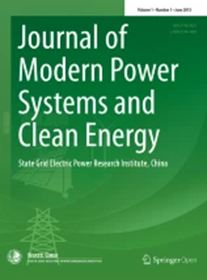弱高压直流送端交流电力系统的稳态电压安全约束最优频率控制
IF 5.7
1区 工程技术
Q1 ENGINEERING, ELECTRICAL & ELECTRONIC
Journal of Modern Power Systems and Clean Energy
Pub Date : 2024-01-02
DOI:10.35833/MPCE.2023.000357
引用次数: 0
摘要
由于大量可再生能源(RES)被连接到高压直流(HVDC)送端交流电力系统,高压直流送端交流电力系统的电压和频率调节能力已经减弱。这就造成了潜在的系统运行问题,如当高压直流链路中存在块状故障时,会同时出现过压和过频。本研究提出了一种针对弱 HVDC 送端交流电力系统的稳态电压安全约束最优频率控制方法。系统频率调节采用可再生能源的综合虚拟惯性控制。利用额外的动态无功补偿装置来控制所有节点的电压,以满足电压安全约束。然后,建立了同时考虑弱高压直流送端交流电力系统频率和稳态电压安全约束的优化模型。通过优化求解,可获得发电跳闸和所需额外动态无功补偿总成本最小的最优控制方案。在修改后的 IEEE 9 总线测试系统和实际的基于青玉换流器的高压直流(LCC-HVDC)送端交流电力系统上进行了仿真,验证了所提方法的有效性。本文章由计算机程序翻译,如有差异,请以英文原文为准。
Steady-state Voltage Security-constrained Optimal Frequency Control for Weak HVDC Sending-end AC Power Systems
Due to the fact that a high share of renewable energy sources (RESs) are connected to high-voltage direct current (HVDC) sending-end AC power systems, the voltage and frequency regulation capabilities of HVDC sending-end AC power systems have diminished. This has resulted in potential system operating problems such as overvoltage and overfrequency, which occur simultaneously when block faults exist in the HVDC link. In this study, a steady-state voltage security-constrained optimal frequency control method for weak HVDC sending-end AC power systems is proposed. The integrated virtual inertia control of RESs is employed for system frequency regulation. Additional dynamic reactive power compensation devices are utilized to control the voltage of all nodes meet voltage security constraints. Then, an optimization model that simultaneously considers the frequency and steady-state voltage security constraints for weak HVDC sending-end AC power systems is established. The optimal control scheme with the minimum total cost of generation tripping and additional dynamic reactive power compensation required is obtained through the optimization solution. Simulations are conducted on a modified IEEE 9-bus test system and practical Qing-Yu line commutated converter based HVDC (LCC-HVDC) sending-end AC power system to verify the effectiveness of the proposed method.
求助全文
通过发布文献求助,成功后即可免费获取论文全文。
去求助
来源期刊

Journal of Modern Power Systems and Clean Energy
ENGINEERING, ELECTRICAL & ELECTRONIC-
CiteScore
12.30
自引率
14.30%
发文量
97
审稿时长
13 weeks
期刊介绍:
Journal of Modern Power Systems and Clean Energy (MPCE), commencing from June, 2013, is a newly established, peer-reviewed and quarterly published journal in English. It is the first international power engineering journal originated in mainland China. MPCE publishes original papers, short letters and review articles in the field of modern power systems with focus on smart grid technology and renewable energy integration, etc.
 求助内容:
求助内容: 应助结果提醒方式:
应助结果提醒方式:


